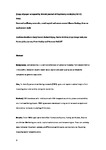Personal wellbeing networks, social capital and severe mental illness: findings from an exploratory study
| dc.contributor.author | Sweet, D | |
| dc.contributor.author | Byng, Richard | |
| dc.contributor.author | Webber, M | |
| dc.contributor.author | Enki, Doyo Gragn | |
| dc.contributor.author | Porter, I | |
| dc.contributor.author | Larsen, J | |
| dc.contributor.author | Huxley, P | |
| dc.contributor.author | Pinfold, V | |
| dc.date.accessioned | 2017-07-03T09:50:51Z | |
| dc.date.available | 2017-07-03T09:50:51Z | |
| dc.date.issued | 2018-05 | |
| dc.identifier.issn | 0007-1250 | |
| dc.identifier.issn | 1472-1465 | |
| dc.identifier.uri | http://hdl.handle.net/10026.1/9581 | |
| dc.description.abstract |
<jats:sec id="S0007125018000284_sec_a1"><jats:title>Background</jats:title><jats:p>Connectedness is a central dimension of personal recovery from severe mental illness (SMI). Research reports that people with SMI have lower social capital and poorer-quality social networks compared to the general population.</jats:p></jats:sec><jats:sec id="S0007125018000284_sec_a2"><jats:title>Aims</jats:title><jats:p>To identify personal well-being network (PWN) types and explore additional insights from mapping connections to places and activities alongside social ties.</jats:p></jats:sec><jats:sec id="S0007125018000284_sec_a3" sec-type="methods"><jats:title>Method</jats:title><jats:p>We carried out 150 interviews with individuals with SMI and mapped social ties, places and activities and their impact on well-being. PWN types were developed using social network analysis and hierarchical<jats:italic>k</jats:italic>-means clustering of this data.</jats:p></jats:sec><jats:sec id="S0007125018000284_sec_a4" sec-type="results"><jats:title>Results</jats:title><jats:p>Three PWN types were identified: formal and sparse; family and stable; and diverse and active. Well-being and social capital varied within and among types. Place and activity data indicated important contextual differences within social connections that were not found by mapping social networks alone.</jats:p></jats:sec><jats:sec id="S0007125018000284_sec_a5" sec-type="conclusion"><jats:title>Conclusions</jats:title><jats:p>Place locations and meaningful activities are important aspects of people's social worlds. Mapped alongside social networks, PWNs have important implications for person-centred recovery approaches through providing a broader understanding of individual's lives and resources.</jats:p></jats:sec><jats:sec id="S0007125018000284_sec_a6"><jats:title>Declaration of interest</jats:title><jats:p>None.</jats:p></jats:sec> | |
| dc.format.extent | 308-317 | |
| dc.format.medium | ||
| dc.language | en | |
| dc.language.iso | en | |
| dc.publisher | Royal College of Psychiatrists | |
| dc.subject | Adult | |
| dc.subject | Aged | |
| dc.subject | Bipolar Disorder | |
| dc.subject | Cluster Analysis | |
| dc.subject | England | |
| dc.subject | Female | |
| dc.subject | Humans | |
| dc.subject | Male | |
| dc.subject | Middle Aged | |
| dc.subject | Personal Satisfaction | |
| dc.subject | Psychotic Disorders | |
| dc.subject | Schizophrenia | |
| dc.subject | Social Capital | |
| dc.subject | Social Participation | |
| dc.subject | Social Support | |
| dc.subject | Young Adult | |
| dc.title | Personal wellbeing networks, social capital and severe mental illness: findings from an exploratory study | |
| dc.type | journal-article | |
| dc.type | Journal Article | |
| dc.type | Research Support, Non-U.S. Gov't | |
| plymouth.author-url | https://www.webofscience.com/api/gateway?GWVersion=2&SrcApp=PARTNER_APP&SrcAuth=LinksAMR&KeyUT=WOS:000431023400010&DestLinkType=FullRecord&DestApp=ALL_WOS&UsrCustomerID=11bb513d99f797142bcfeffcc58ea008 | |
| plymouth.issue | 5 | |
| plymouth.volume | 212 | |
| plymouth.publication-status | Published | |
| plymouth.journal | British Journal of Psychiatry | |
| dc.identifier.doi | 10.1192/bjp.bp.117.203950 | |
| plymouth.organisational-group | /Plymouth | |
| plymouth.organisational-group | /Plymouth/Faculty of Health | |
| plymouth.organisational-group | /Plymouth/Faculty of Health/Peninsula Medical School | |
| plymouth.organisational-group | /Plymouth/REF 2021 Researchers by UoA | |
| plymouth.organisational-group | /Plymouth/REF 2021 Researchers by UoA/UoA03 Allied Health Professions, Dentistry, Nursing and Pharmacy | |
| plymouth.organisational-group | /Plymouth/Research Groups | |
| plymouth.organisational-group | /Plymouth/Research Groups/FoH - Community and Primary Care | |
| plymouth.organisational-group | /Plymouth/Research Groups/Institute of Health and Community | |
| plymouth.organisational-group | /Plymouth/Research Groups/Institute of Translational and Stratified Medicine (ITSMED) | |
| plymouth.organisational-group | /Plymouth/Research Groups/Institute of Translational and Stratified Medicine (ITSMED)/CBBB | |
| plymouth.organisational-group | /Plymouth/Research Groups/Institute of Translational and Stratified Medicine (ITSMED)/CCT&PS | |
| plymouth.organisational-group | /Plymouth/Research Groups/Plymouth Institute of Health and Care Research (PIHR) | |
| plymouth.organisational-group | /Plymouth/Users by role | |
| plymouth.organisational-group | /Plymouth/Users by role/Academics | |
| dc.publisher.place | England | |
| dcterms.dateAccepted | 2017-05-08 | |
| dc.rights.embargodate | 2019-05-01 | |
| dc.rights.embargodate | 2019-05-01 | |
| dc.identifier.eissn | 1472-1465 | |
| dc.rights.embargoperiod | 12 months | |
| rioxxterms.versionofrecord | 10.1192/bjp.bp.117.203950 | |
| rioxxterms.licenseref.uri | http://www.rioxx.net/licenses/under-embargo-all-rights-reserved | |
| rioxxterms.licenseref.startdate | 2018-05 | |
| rioxxterms.type | Journal Article/Review |


